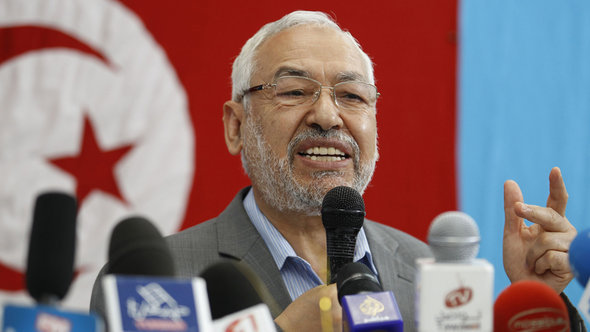''The Islamists Are Not Ready for a Democratic Culture''
You have written over and over again about how creative thought in Islam has been flagging since the Middle Ages and how religion has given the impression of being a guide to immaturity. Do you consider the revolutions in Tunisia and Egypt to be the start of a new era of the self-empowerment of the individual or – to quote Kant – to be "the emergence of humankind from its self-imposed immaturity"?
Abdelwahab Meddeb: The Islamists who are now in power did not take part in the revolutions in Egypt and Tunisia. Indeed the very fact that no religious slogans whatsoever were chanted during the revolution is in itself interesting. For this reason, it is safe to say that the election of the Islamists to government and their appearance on the political stage constitutes a kind of hijacking of the revolution.
For me, the Islamists have nothing to do with the Islamic tradition of the Middle Ages. After all, the text-based tradition of the Islamic Middle Ages was complex and ambiguous. It was based on controversy and the plurality of thought. Above all, however, it was part of a universal, historical theocentric age. In this age, God was at the centre of all societies.
When attempts are made today to put God back at the centre of society instead of humankind, then for me, that is an enormous step backwards. Islamism has changed from being a religious tradition into an ideology. As a religion, Islam has – just like all religions – a global vision. In other words, they want to assert their influence in all areas.

It is all about organising life on earth in such a way as to pave the way to an eternity in heaven. However, while the tradition is gradually transforming into an ideology – and also because it is doing so – this global vision is prone to totalitarianism. During the revolution, there was a kind of utopia in the Arab world. People believed that they could shape politics from outside the political sphere. Those who started the revolution came from outside the political sphere. That was what was so fascinating.
In addition to intervention via Internet, there was something almost situationist, anarchic, about the whole thing. Perhaps it is comparable with the post-ecological movement of the young, the Pirate Parties – with people who want to address certain issues, want to make progress in a certain area.
The question that arises in the long run is whether this is a way of doing politics. Or is it impossible to do politics without the structures of an organised party, without people who share the same ideas, without people who are working towards a clear goal. The phase we are in at the moment shows us that so far, this situationist vision is still utopian.
You are in favour of learning from a forgotten Islam that dates from an era when there was livelier and more liberal debate within the religion. Do you think that this tradition will be revived through the revolution and that it will create space for debate, which would allow the political freedom that people are calling for to go hand in hand with intellectual freedom?
Meddeb: At present, there is an open debate between secularists and Islamists in Tunisia. This is the first time that this has ever happened. Indeed, I think that people have long since forgotten the culture of listening to each other. We are currently in a period of transition. The period that follows will be critical. The question is whether another Islamist victory would mean a victory for totalitarian elements and a hindrance to freedom.
That being said, I think that it will be difficult to retract the freedoms that have already been won, especially as these freedoms are attractive, people have become accustomed to them. This is a completely new experience. However, it is, of course, also possible that things could take a turn for the worse. For this reason, the situation will remain very tense.
Why do you contradict the theory that Arab societies have to go their own way and come up with their own Enlightenment?
Meddeb: For me, the whole thing is very simple. Why should everyone come up with his or her own Enlightenment? In the Islamic tradition, there were already premisses for an Enlightenment at a very early stage, i.e. in the eleventh and twelfth centuries. It is very important to remember that there were elements of an Enlightenment in the Arab tradition.
So why waste time inventing something that already existed? This reminds me of a remark made by Averroes, who accused theologians of having adopted a lot from the Greeks. He said that they had discovered something exceptional, something that Muslims were now taking on board and using to their own benefit. Above all, however, Muslims were able to use it in the knowledge that it was not the result of divine grace, but of human effort alone.
In Egypt, the Muslim Brotherhood is in power. In Tunisia, Ennahda is in power. Both reject laicism. As a convinced secularist, are you concerned by these developments?
Meddeb: I would like to answer that question by pointing to the Turkish model and the example of Erdogan. When Erdogan travelled to Tunisia and Egypt, he said something very important with regard to laicism. He explained that he was a devout Muslim with a deep respect for faith, a faith that he practices in accordance with Muslim culture and rites. Nevertheless, he made it clear that when it comes to politics, he is a servant of a secular state, which prescribes a separation of religion and politics and is the best possible form of government.
But Erdogan's words did not meet with universal approval ...
Meddeb: Quite so. The Egyptians countered that this form of government was specific to Turkey. After all, Erdogan steers political business with the image of Ataturk looming large over him all the time – and Ataturk was an enemy to the Islamists. We have our own Ataturk in Tunisia. We have Bourguiba, who was also opposed to the Islamists of Ennahda. We defend Bourguiba. To bring down Bourguiba's legacy would require violence because half of all Tunisians still subscribe to Bourguiba's ideas. His ideas endure to this day.

Whether Erdogan's Islamism has really developed into an Islamic democracy will only become clear on the day that change occurs. So far, Erdogan has not been voted out of office. I am waiting for the day when he loses an election and I will watch with interest to see how he leaves office and returns to his own home. I don't think that the Islamists are ready for a democratic culture. I will believe in an Islamic democracy when I see this change actually taking place in the form of a democratic handover of power. In other words, change will be the ultimate proof.
Overall, you are very sceptical about the political developments that have occurred since the upheaval in North Africa ...
Meddeb: While the dictatorships were certainly intolerable, now that they are gone, it is important to make sure that a secular dictatorship is not followed by a religious dictatorship. After all, that would certainly be worse than a secular dictatorship. In short, the great challenge we face is to find out how we can prevent a possible religious dictatorship.
Interview conducted by Ceyda Nurtsch
© Qantara.de 2013
Translated from the German by Aingeal Flanagan
Editor: Lewis Gropp/Qantara.de
